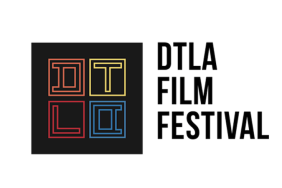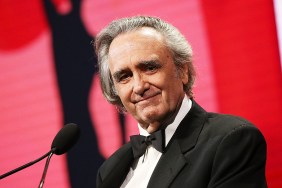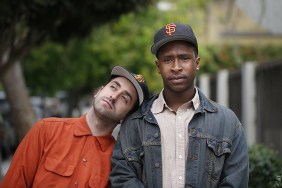Editor and writer Chris Alexander talks to filmmaker Ernie Barbarash about his obscure 2007 chiller They Wait

So with that, I thought I’d see what Ernie was up to with this picture and I’m certainly glad I did. They Wait (which strangely was produced by noted “bad” movie director Uwe Boll) stars Jaimie King as a woman re-married into a Chinese-Canadian family and whose Stepson seems to be in the grip of some sort of supernatural threat whose roots are wired deep into Chinese ghost-lore. But there’s more to the haunting than that and soon mother and child are waist deep in a terrifying mystery and conspiracy both spectral and dangerously tangible.
They Wait gripped me with its atmosphere, style and serious-minded approach to the genre as well as its sensitive and respectful examination of the West coast Chinese community, a voice you rarely see represented in mainstream genre cinema.
I left noting that Barbarash had delivered an effective chiller, unpretentious and direct. But to my surprise, the movie sort of vanished, or at least didn’t land back on my radar post-fest. In fact, I forgot about the movie entirely. That is, until a few weeks ago when I stumbled upon the movie on cable and appreciated it anew.
I was re-impressed enough to connect with Barbarash and conduct the They Wait interview I should have conducted almost a decade prior.
Here is that chat…
SHOCK: It’s alarming to see Uwe’s name attached to such a thoughtful, subtle picture. How did you connect with Boll?
BARBARASH: Thanks for the kind words. I didn’t really have any contact with Boll during filming and post. I believe that he was a key player in the financing structure because his company was responsible for international sales on the film. From what I remember, his creative input had to do with feedback on casting more than anything else. And to be fair, I have to admit that I’ve never actually seen one of his films. I heard about them, I have friends in Vancouver who have worked on a few but that’s about it, so I hate to pass judgement on someone’s work until I’ve seen it…
SHOCK: Was the story steeped in truth? The idea of a “bone collector” shipping immigrant bones back home?
BARBARASH: Very much so. From my reading on the subject, the story is indeed based on a Chinese tradition of Chinese immigrants to faraway places such as North America shipping their bones by boat to their place of birth to rest with their ancestors. I was not involved in the original script but I did do a couple of rewrites to help streamline the story quite significantly, to amp up a lot scares and suspense and finally to make it possible within our production parameters – and in preparing for this I read some research as well as a piece of fiction written about Chinese immigrants to Canada that mentioned this very same tradition. We also had some incredible older Chinese actors in the film – Pei Pei Cheng, Henry O, Colin Foo, Tseng Chang – there were definitely instances in which they kept us on the straight and narrow.

SHOCK: On that note, how meticulous was the film when dealing with Chinese lore and mythology?
BARBARASH: On one hand, we were as faithful as possible regarding the tradition of “bone collecting”, the tradition of “Hungry Ghost Month” and its “sacrifices”, as well as the disturbing use of bears and other protected or rare species as quasi-medical remedies or tradition-based potency potions, with no scientific basis, I hasten to add. On the other hand, some of the visuals and specifics as to demon mythology and the visit into the afterlife, that came out of our imaginations and all kinds of references I’ve collected over the years more than anything else. From what I remember – forgive me, because this was about 9 years ago now – we had some script problems to solve very quickly to help solve some scheduling issues during production – so much of the afterlife and demonology elements had to be made up pretty quickly while we were already in prep. For example, I got the idea of that store clerk scaring our lead boy in the store while racing to the airport one morning, just musing about “what would scare the crap out of a kid?” – and it sort of just came to me all at once – that line of “You know what ghosts really love to eat? Children.” – and then BOOM. That’s my favorite scene in the movie to this day and even though I didn’t get to see the screening at Toronto, I do remember several people who were there telling me that the moment got a huge reaction.
SHOCK: Jaimie King is so good in the film, a strong character and deftly portrayed. Was it easy to cast the mother? Was she always your Sarah?
BARBARASH: Yes, Jaime was excellent in the film on every level. She’s an incredibly strong actor very committed to truth in storytelling and we were all so very lucky that she agreed to join us on the adventure. I would love to take sole credit for casting her, but it was very much collaboration between our producers Steve Hegyes and Shawn Williamson, and yes, with input from Uwe Boll. But boy, what an excellent choice. She really nailed the role.
Buy They Wait on DVD from Amazon
SHOCK: Seeing this at TIFF, I was immediately taken by how it plays its horror straight. Do you think some critics just don’t “get it” when contemporary filmmakers do this? Like they need irony, cynicism, self-awareness in genre films in order to allow themselves to enjoy it?
BARBARASH: As I said, I sadly missed the screenings at TIFF because I was shooting a TV series in Vancouver at the time and just couldn’t get away. I understand the desire for irony, cynicism, etc. I mean I enjoy it in genre films too; I think it comes from a combination of wanting humorous moments in a horror films as a respite from the terror – otherwise the horror has nothing to play against and there’s a danger of it all becoming very one note – and a bit of the “needing to whistle when walking past a graveyard” impulse that Stephen King describes in one of his essays. And I think it comes from the fact that we are all so over-saturated with stories of all kinds in all media, that we sort of crave the extra layer of self-awareness so that we can almost feel smarter than the material – because we all know we’re constantly watching the stuff. Again, not to say that I don’t appreciate it as much as the next guy, but They Wait was just never envisioned as that kind of movie and especially as a director who came in fairly late in the process, it never even occurred to me to change the tone of the film to that an extent. Finally, I don’t think it needed it.
SHOCK: Further to that…what happened to the film post-festivals? Who distributed it?
BARBARASH: I believe that after being well received at various festivals including TIFF and Vancouver, They Wait was picked up by Universal in the US and Sony and others in Canada and went straight to DVD. It’s too bad that it never got a theatrical release, but I get it – I mean I understand the business decisions that go into making that call. For a genre film to compete in the theatrical marketplace, you need so much money to be able to measure up to big studio releases that it’s often really impractical for a distributor to even try. I think part of the problem too was that the story, which I believe had been around for some years, should really have been made years earlier, right before there was a flurry of American remakes of J-Horror: The Ring, Dark Water etc. I sometimes think that if They Wait had been made before or exactly at the same time as those films, it would have gotten a bigger audience.

SHOCK: I liked the use of sound in the film, as well as Hal Beckett’s score. Can you speak on the sound design and the music? Were you hands on in these departments?
BARBARASH: I was as hands on in sound design and music as I always am – which is to say quite a bit, from start to finish. As always, the editor and I (in this case Lisa Robison, who’s a brilliant Vancouver-based editor and one of the smartest film and TV people I know), put together a temp music track and temporary sound effects when we did the picture cut and then everyone, Hal the composer, the sound designer, everyone, screens the cut with that temp music and sound to at least get the feel we’re going for, and then they come in with some new ideas, some similar ideas, and after some experimentation and back and forth, the pros just do it all a whole lot better than I originally imagined. I remember that one challenge that Hal and I created for ourselves was how to use authentic Chinese instruments in the score of the film and I think he did a fantastic job with that, despite, from what I remember, my insisting that the haunting song the boy hears be a specific way or even a specific set of notes that made that particular kind of instrumentation actually quite difficult, but Hal really nailed it despite me being such a pain.
SHOCK: Was it a particularly challenging or stressful shoot?
BARBARASH: As always, most of the challenge was in the time constraints. We had a lot to shoot on a relatively limited schedule – and of course we wanted it to look rich and spooky – and our cinematographer, Greg Middleton – who now shoots Game of Thrones and who previously shot The Killing – he’s a genius with light and shadow but to maintain that look takes time. As I sometimes say “movie magic” isn’t real magic – it’s often just very hard work by very talented people. Oh yeah, another challenge was one particular location; for various reasons, we decided to build a couple of our key sets – Cheng Pei Pei’s apartment and also the sweatshop factory and its secret rooms and hallways in this large old barn on the outskirts of greater Vancouver – and even though our crew spent insane hours in prep cleaning the place from top to bottom, well, the lesson we learned is that you can never fully clean out an old barn. At times it got so bad from some of the stuff we’d dug up that some of the crew wore these face masks for the smell and particles in the air – and then we’d have both actors and crew who were just day players come and join us for the day and I remember these darkly funny moments in which the newcomers would look at most of us in these masks and ask if they needed masks too and some of the regulars would say completely seriously “No, no, you’ll be fine. Why are you asking?” – as a joke – and we’d all crack up because the whole scene was so bizarre at first glance.
SHOCK: In the ensuing decade, how has They Wait followed you? Do people speak on it fondly? Do you think it will find a cult?
BARBARASH: I sure hope it continues to find fans who see it, enjoy it and tell others. Not much I can do to influence that. I’m often of the attitude that I make the movies and how people ultimately react is up to them. Every once in a while I get a message on Facebook from someone who’s seen it and likes it either because it scared them or because they were intrigued by the idea of a ghost movie that comes from a non-Western tradition and of course it’s gratifying to hear people praise your work from almost a decade ago… It’s followed me mostly in what I learned from the experience of making the film about how to build suspense, how to effectively scare an audience in a movie, and the lessons I learned from our great team, both in front of and behind the camera. I’ll always be grateful to producers Steve Hegyes and Shawn Williamson for bringing me along for the ride.









